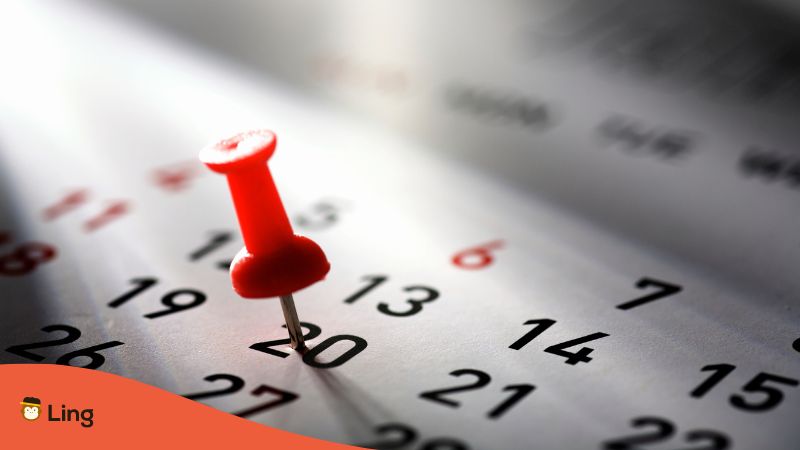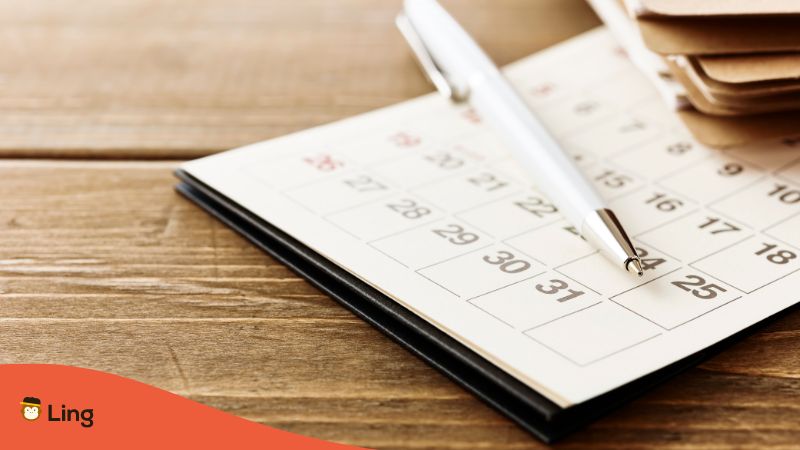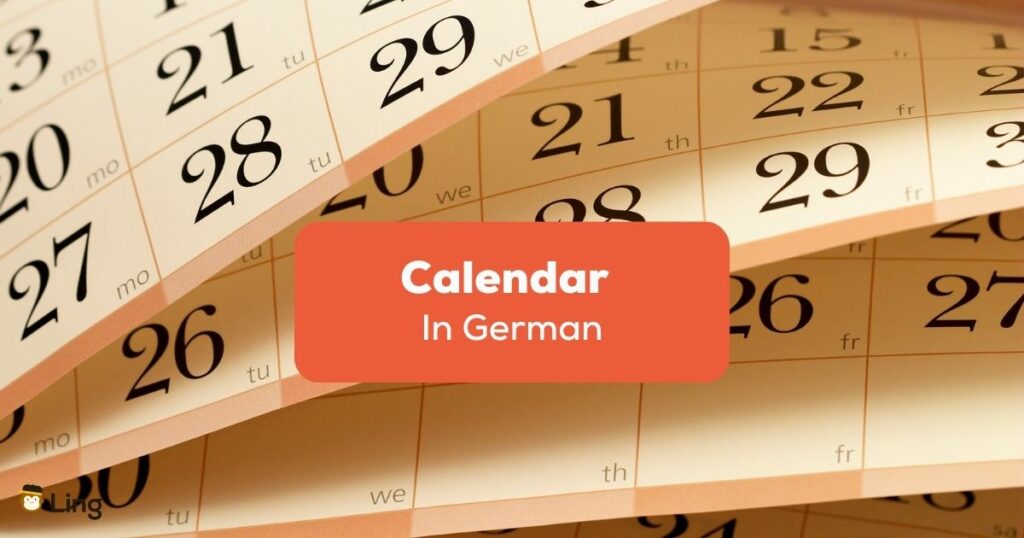Are you planning to visit Germany on your next long weekend? Before you book your flight and activities, there’s one essential thing you should keep in mind – the German calendar! Knowing the observances and public holidays will help you make the most out of your trip. In this post, we’ll guide you through the German translations for months, seasons, days, and dates so that you can check German calendars the right way. With our helpful tips, you’ll be able to plan your visit to Germany with ease and enjoy every moment of your stay. So, keep reading below!
Traveling is an exhilarating experience that many of us eagerly anticipate. It’s not just about capturing the perfect TikTok or Instagram post; it’s an opportunity to connect with other cultures and explore the world around us. I still remember the excitement I felt when I blew my first salary on a trip to Batanes in the Philippines in my early 20s. It was a life-changing experience that ignited my curiosity to explore new countries beyond my own. That’s why the following year, I set my sights on discovering somewhere entirely new to me – and that’s how I found myself in Northern Germany!
But here’s the thing, when I stepped out of the airport and hailed a cab to go directly to my hotel, I noticed that most shops were closed! When I asked the kind driver, he told me that shopping on a Sunday is somewhat nicht erlaubt (not allowed). It’s not that you’ll be arrested for purchasing a bag of chips or bars of chocolates, it’s just that the country views Sunday as a rest day. If you’re in dire need of the essentials, you can still get your supplies from gas station mini-marts, flea markets, and pharmacies.
To be honest, I was shocked to learn that shops in the country weren’t open 24/7, as is the norm in the Philippines. However, this didn’t stop me from enjoying my trip in any way. In fact, it made me appreciate the country even more because I was able to spend more time exploring museums and parks instead of just window shopping. By immersing myself in the local culture, I felt a deeper connection to the country and its people.
I even got the chance to share with the locals my surprise about this no-shop Sunday thing, and that’s when I learned something surprising: Verkaufsoffene Sonntage! The Verkaufsoffene Sonntage refers to special Sundays wherein larger stores are allowed to operate from 13:00 to 20:00. Sounds super unique, right? Well, my friends, that’s just the start! Let’s get to know more in the sections below!

Months In The German Calendar
Are you planning a trip to northern or eastern Germany? Will it be this Oktober or next Januar? As you can see, knowing the months of the year in German can be incredibly useful when planning your trip and communicating with the locals. Luckily, the translations for each month are relatively simple to remember since they closely resemble the English translations. Take a look at them below and the example sentences.
| English | German | Sample Sentence In English | Sample Sentence In German |
|---|---|---|---|
| January | Januar | My birthday is in January. | Mein Geburtstag ist im Januar. |
| February | Februar | February is the shortest month of the year. | Februar ist der kürzeste Monat des Jahres. |
| March | März | March comes in like a lion and goes out like a lamb. | März kommt wie ein Löwe und geht wie ein Lamm. |
| April | April | April showers bring May flowers. | Aprilschauer bringen Mai-Blumen. |
| May | Mai | May is my favorite month. | Mai ist mein Lieblingsmonat. |
| June | Juni | The summer solstice is in June. | Die Sommersonnenwende ist im Juni. |
| July | Juli | The Fourth of July is an important holiday in the United States. | Der vierte Juli ist ein wichtiger Feiertag in den Vereinigten Staaten. |
| August | August | August is usually hot. | August ist normalerweise heiß. |
| September | September | September marks the start of fall. | September markiert den Beginn des Herbstes. |
| October | Oktober | Oktoberfest is a famous festival in Germany. | Das Oktoberfest ist ein berühmtes Festival in Deutschland. |
| November | November | November is a great time to travel. | November ist eine großartige Zeit zum Reisen. |
| December | Dezember | December is the month of Christmas. | Dezember ist der Weihnachts-Monat. |

Weeks In The German Calendar
It’s not enough that you know the translations for the months, right? In this section, we’ll now learn the translations for the German Wochentage or days of the week.
| English | German | Sample Sentence In English | Sample Sentence In German |
|---|---|---|---|
| Monday | Montag | I have a meeting on Monday. | Ich habe am Montag eine Besprechung. |
| Tuesday | Dienstag | Tuesday is my busiest day of the week. | Dienstag ist mein geschäftigster Tag der Woche. |
| Wednesday | Mittwoch | Let’s meet on Wednesday after work. | Lass uns am Mittwoch nach der Arbeit treffen. |
| Thursday | Donnerstag | We’re having a party on Thursday night. | Wir feiern am Donnerstagabend. |
| Friday | Freitag | Friday is my favorite day of the week. | Freitag ist mein Lieblingstag der Woche. |
| Saturday | Samstag | I like to sleep in on Saturdays. | Ich schlafe gerne samstags aus. |
| Sunday | Sonntag | Sunday is a good day to relax. | Sonntag ist ein guter Tag zum Entspannen. |
Dates In The German Calendar
So now that we already nailed down the months and days of the week in German, let’s not focus on the dates. After all, learning how to express dates in this language can be useful for communicating and understanding schedules, events, and appointments.
Writing The Date
In German, the date is typically written in the order of day-month-year, as opposed to the month-day-year format used in the United States. For example, April 12th, 2022, would be written as 12th April 2023.
Saying The Date
To say a date in German, follow this format: “der” + day + month + year. For example, April 3rd, 2023, would be “Der dritte Mai 2023.” To help you swap the days easily, check out the table below.
| English | German |
|---|---|
| 1st | erste |
| 2nd | zweite |
| 3rd | dritte |
| 4th | vierte |
| 5th | fünfte |
| 6th | sechste |
| 7th | siebte |
| 8th | achte |
| 9th | neunte |
| 10th | zehnte |
| 11th | elfte |
| 12th | zwölfte |
| 13th | dreizehnte |
| 14th | vierzehnte |
| 15th | fünfzehnte |
| 16th | sechzehnte |
| 17th | siebzehnte |
| 18th | achtzehnte |
| 19th | neunzehnte |
| 20th | zwanzigste |
| 21st | einundzwanzigste |
| 22nd | zweiundzwanzigste |
| 23rd | dreiundzwanzigste |
| 24th | vierundzwanzigste |
| 25th | fünfundzwanzigste |
| 26th | sechsundzwanzigste |
| 27th | siebenundzwanzigste |
| 28th | achtundzwanzigste |
| 29th | neunundzwanzigste |
| 30th | dreißigste |
| 31st | einunddreißigste |

Seasons In The German Language
Germany experiences four distinct seasons, each with its own unique weather patterns and attractions. Here’s a brief overview of each season and the best time to visit Germany:
Spring = Frühling (March To May)
Spring in Germany is a beautiful time of year, with flowers blooming and temperatures warming up after the cold winter months. March can still be chilly, but by April and May, the weather is usually mild and pleasant. Spring is a great time to visit Germany for outdoor activities like hiking and cycling, joining the Carnival of Cultures in Berlin, and celebrating special holidays like Tag der Arbeit and Whit Monday.
Summer = Sommer (June To August)
Who doesn’t love the summer months? Summer in Germany is the peak tourist season, with long, sunny days and warm temperatures. It’s a great time to explore Germany’s many cities and visit the beaches along the North Sea and Baltic coasts. However, be prepared for large crowds and higher prices during this time.
Fall = Herbst (September To November)
Fall in Germany is a time of changing colors, cooler temperatures, and a variety of festivals and events. September and October are particularly popular months for tourism, as the weather is usually mild and pleasant, and festivals like the Frankfurt Book Fair and the Stuttgart Beer Festival take place. November can be chilly and rainy, but it’s a great time to experience the festive atmosphere of Germany’s Christmas markets.
Winter = Winter (December To February)
Winter in Germany can be cold and snowy, particularly in the mountainous regions. However, it’s also a magical time of year, with festive markets, mulled wine, and holiday lights brightening up the cities. Winter is a great time to visit Germany for winter sports like skiing and snowboarding and to experience the traditional Christmas markets that take place throughout the country.
Learn More With Ling!
Want to master the German language? Say goodbye to chunky textbooks and hello to Ling! Ling is the leading language-learning app for getting to know German and 60+ other languages! From useful sets of words to expressions and grammar notes, this app got you covered! Unlike other platforms, Ling also capitalizes on the use of fun gamified features so you can learn in a matter of weeks!
Ready to give it a try? Download it now from the Play Store or App Store to get started!



































